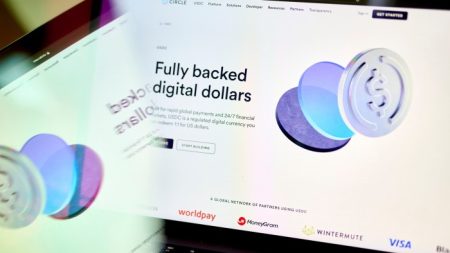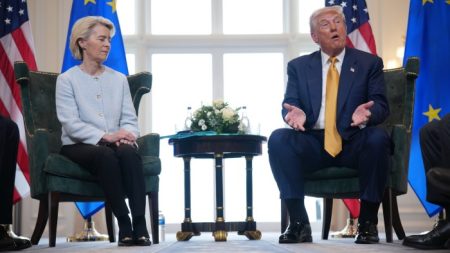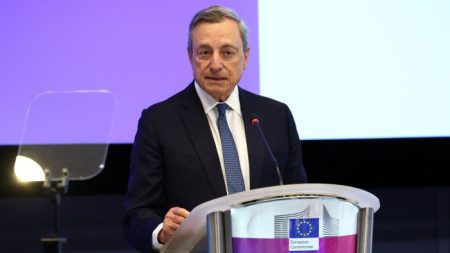A federal judge issued a gag order on former FTX CEO Sam Bankman-Fried, restricting his ability to speak publicly about his case, after US prosecutors asked a federal judge to jail him over allegations of witness-tampering.
Prosecutors accused Bankman-Fried of leaking his former girlfriend and business partner’s personal writings to the New York Times. They said last week that Bankman-Fried, 31, had attempted to discredit their star witness, Caroline Ellison, who is expected to testify against him at his trial in October.
In a hearing before US District Court Judge Lewis Kaplan on Wednesday, Assistant US Attorney Danielle Sassoon cited multiple instances of the FTX founder actively communicating with the media and alleges he was a source for multiple stories – part of an “ongoing campaign with the press that has now crossed a line,” she said.
Sassoon cited the “defendant’s history of obstruction in the form of setting auto deletion” in communications related to FTX and the use of a VPN to subvert monitoring.
The prosecution “placed too much trust in the defendant” and now believes it is “not possible to design a set of adequate release conditions” to ensure the safety of the community.
Bankman-Fried’s lead attorney, Mark Cohen, suggested the defense hadn’t been given sufficient lead time from prosecutors regarding the request to jail him, saying the defense found out about the change “one minute before court.”
Cohen also noted the unusually large volume of discovery documents – 32 million pages so far, he said. “This is a complex case involving complex financial transactions,” making it “almost impossible to work with our client if he were remanded,” he said.
Judge Kaplan said he would issue a temporary gag order while giving both sides time to prepare more formal presentations before ruling on the government’s proposal for detention.
“I am aware pretty fully about the document issues and the need for access by the defendant. I am certainly very mindful of his First Amendment rights. I am very mindful of the government’s interest in this issue, which I take very seriously,” Kaplan said. “Mr. Bankman-Fried, you better take it seriously too.”
The prosecution said it would submit its argument by Friday, and the defense would make its case by August 1. For now, Bankman-Fried remains out of jail.
At a previous bail hearing, Kaplan alluded to the possibility of revoking Bankman-Fried’s bail deal and forcing him to await trial in jail. But he has also extended leniency on Bankman-Fried’s use of electronic devices, citing the complexity of his case.
Cohen reiterated Bankman-Fried’s constitutional right to speak to the press and said that he didn’t violate the terms of his bail.
“The government is pretending it never speaks to the media about this case,” he said.
Lawyers for Bankman-Fried previously said that they would comply with a gag order but requested that it apply equally to all parties, including “the government and all potential witnesses in this case.”
Wednesday’s hearing marks yet another pre-trial stumble for Bankman-Fried, who was released on a $250 million bond following his arrest in December. He is preparing for trial under house arrest at his parents’ Palo Alto, California, home.
In February, Judge Kaplan tightened restrictions on Bankman-Fried’s bail after prosecutors flagged a direct message Bankman-Fried sent to a former FTX employee, raising concerns about potential witness-tampering.
Since his arrest, Bankman-Fried has ignored the standard legal advice of remaining silent in the run-up to trial, frequently speaking to the media and blogging about his experience.
His lawyers have pushed back on prosecutors’ allegations of witness-tampering. Citing a “toxic” media environment that has been “almost uniformly” negative, Bankman-Fried “has a right to counter that public narrative by making fair comment in the media,” his lawyers wrote.
Bankman-Fried’s lawyers say that the New York Times article had been “in process for months” and that the reporter already had other sources.
In the article, the Times quotes from private diary entries that Ellison wrote in Google Docs. The documents reportedly detailed her “unhappy and overwhelmed” emotional state as CEO of Alameda Research, FTX’s crypto hedge fund. The writings also reportedly expressed her doubts about her ability to make decisions and effectively run the business.
Ellison, who is 28, pleaded guilty in December to multiple counts of conspiracy and fraud for her role in a scheme that led to the collapse of FTX.
Bankman-Fried, the founder of both Alameda and FTX, has pleaded not guilty to eight federal counts of fraud and conspiracy.
A trial date has been set for October 2.
Read the full article here














